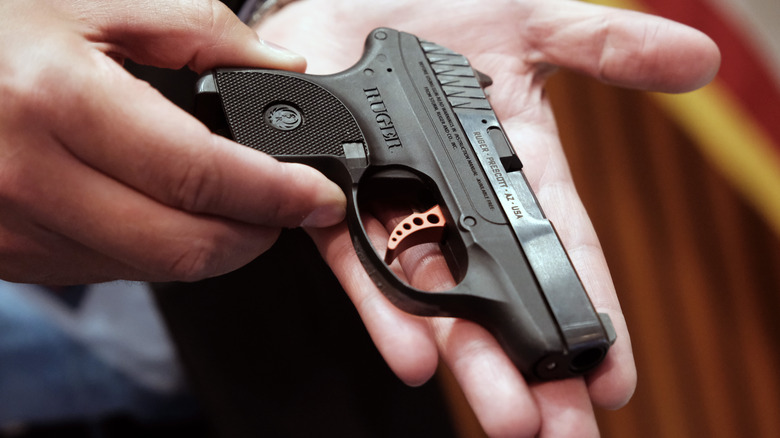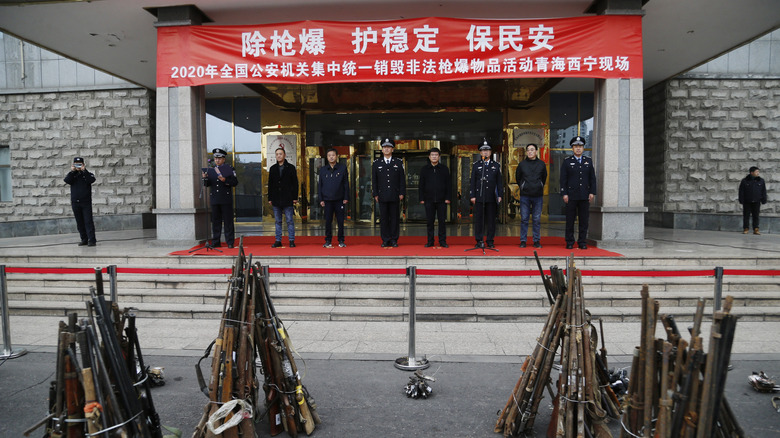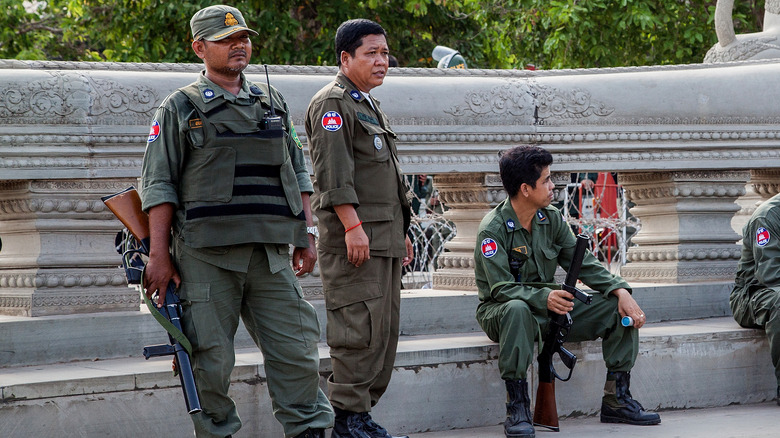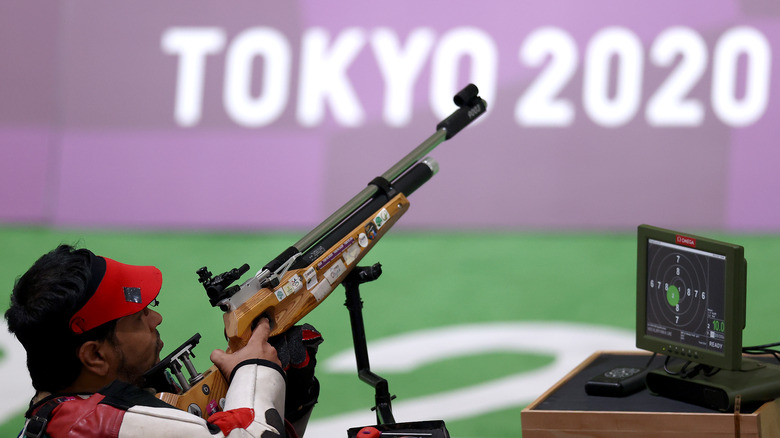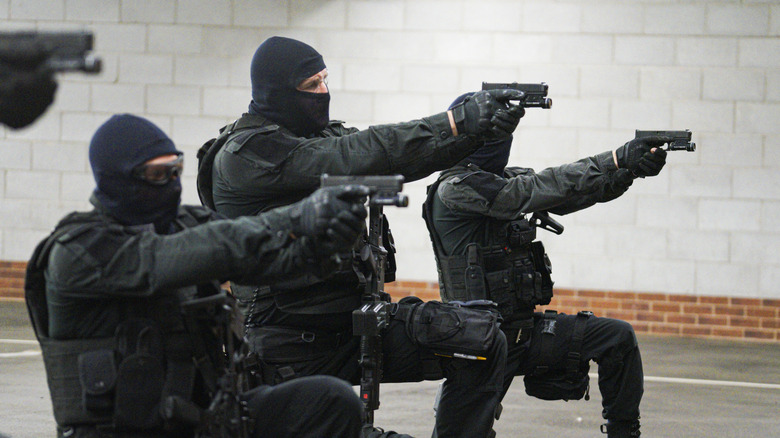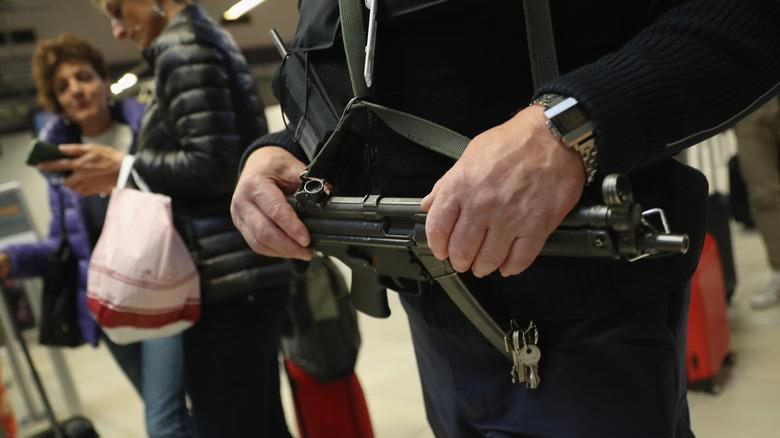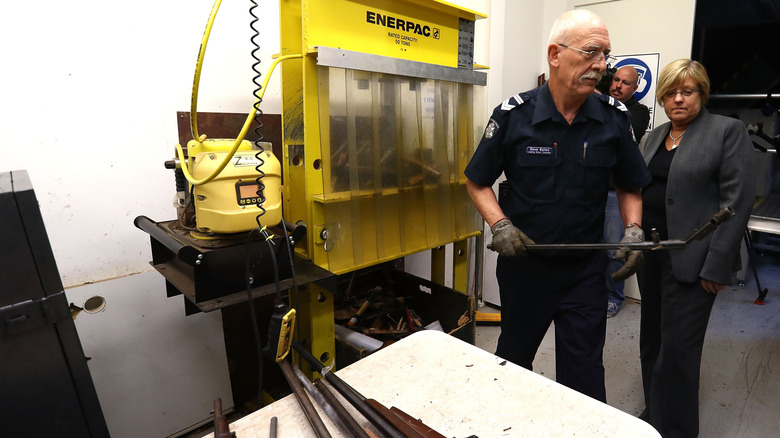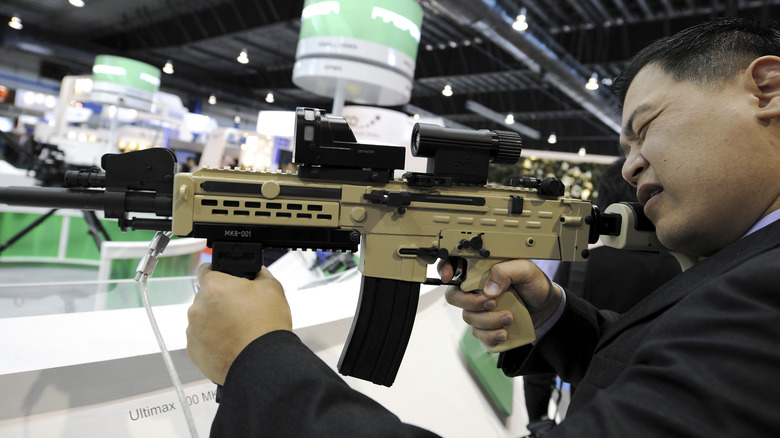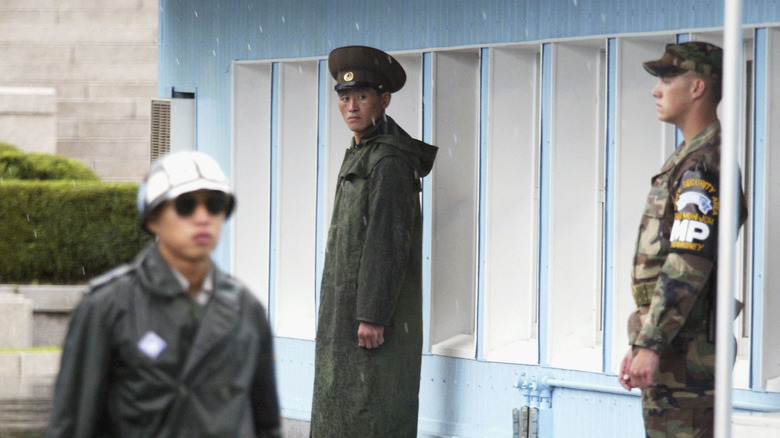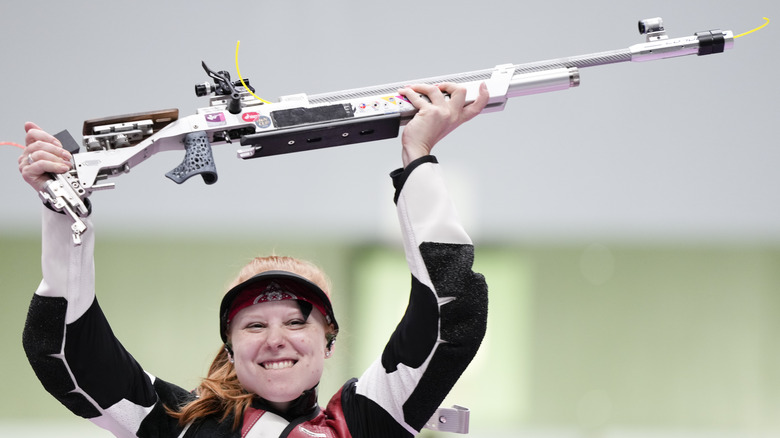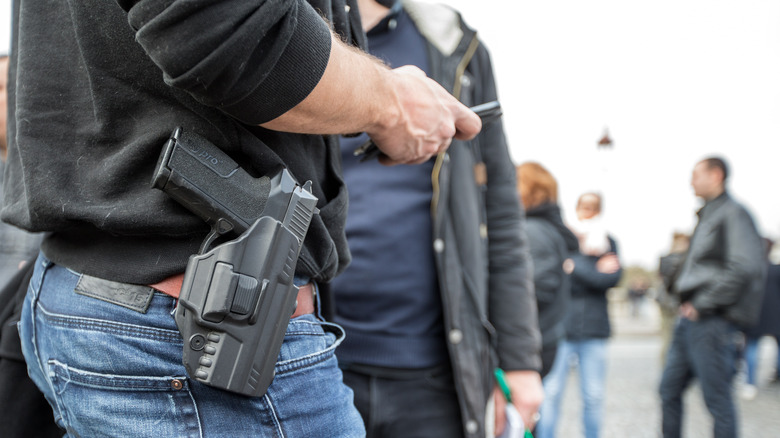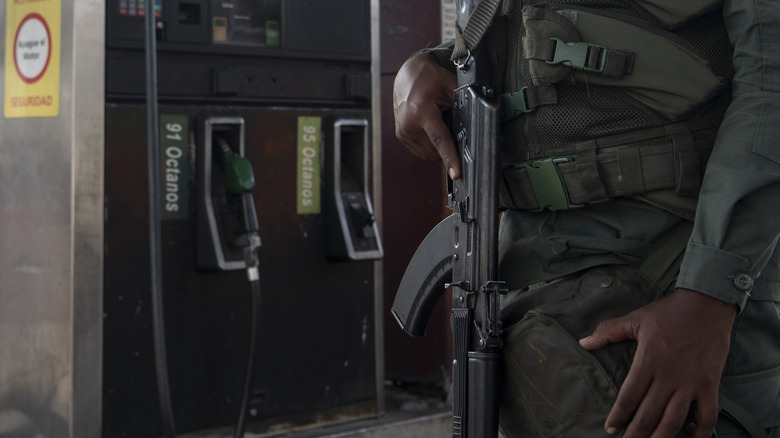Countries With The Strictest Gun Laws
In America, gun ownership is a constitutional right. The Second Amendment, which was ratified in 1791, reads, "A well-regulated Militia, being necessary to the security of a free State, the right of the people to keep and bear Arms, shall not be infringed." In the ensuing 231 years, the United States has become famous — or infamous — for its gun culture.
According to NBC News, there are more guns in America than people. Specifically, there are 120 guns per 100 people. This figure is far higher than other countries with high gun ownership. Yemen, which is the nation-state with the second-highest level of gun ownership, has just 52.8 firearms per 100 people (via World Population Review). In countries with similar cultures and economies, such as the United Kingdom and Germany, the politics of firearms are quite different. Comparatively poor nations, too, like Cambodia and India, have very different approaches to gun legislation. Here are the countries with the strictest gun laws.
China
In 1927, Chairman Mao Zedong stated (per CNN), "Political power grows out of the barrel of a gun." Modern China continues to take heed of this observation, maintaining a near-total ban on civilian ownership of firearms.
China's policy on firearms has been adjusted over the years, including a tightening of legislation in 1989 following the Tiananmen Square massacre. The policy was formalized in 1996, when the Chinese Communist Party (CCP) limited gun ownership to a tiny minority, including law enforcement, security personnel, government-approved sports shooters, and government-approved hunters. Perhaps as a consequence, China has very low levels of gun violence, reporting mere dozens of gun deaths a year. However, while gun control is popular with most Chinese citizens, CCP policy has also seen dubious legal actions. In 2016, for example, a 20-year-old man received a life sentence for buying replica guns on the internet. Authorities granted clemency after public outcry, reducing his sentence to seven years.
Also, China is not immune to mass violence. CNN has reported mass stabbings across the People's Republic, including an attack at a mall in December 2020 that left seven people dead. Stabbing attacks have occurred in schools, too, killing 22 children in the early 2010s (via BBC). One of the worst knife attacks took place in March 2014, when the BBC reported that knife-wielding men had stabbed dozens of commuters at a Kunming railway station in what was described by authorities as a "premeditated, violent terrorist attack."
Cambodia
Following the terrible violence of the Cambodian Civil War and the Khmer Rouge genocide, gun ownership was common among all elements of society, from village people to city dwellers. Particularly common was the AK-47 assault rifle, which Control Arms described as "the world's favourite killing machine." This changed in the late 1990s when the Cambodian government organized a nationwide hand-in program and banned civilian firearm possession (via VOA). Government officials were inundated with all manner of weapons, from pistols and rifles to grenades and rocket launchers. These tools of Cambodia's violent past were piled high and destroyed, either by road rollers or roaring bonfires.
Despite the willingness of many Cambodians to hand in their weapons, civilian gun ownership has not been quashed. In 2017, it was estimated that 717,000 guns were in civilian hands (via GunPolicy.org). A few years later, the New Straits Times reported that authorities in Phnom Penh, the nation's capital, were cracking down on illicit firearms. Penalties for the illegal possession of weapons, explosives, and ammunition includes jail terms of six months to two years and fines between 500,000 and 2,000,000 riel (US$125 and US$500).
Like in China, there are exceptions to the ban. Guns may be owned by members of the National Assembly, the Senate, the Constitutional Council, and the Supreme Council of the Magistracy.
Japan
Japan is a country of 127 million people. Yet, remarkably, in 2018, the East Asian nation experienced just nine gun deaths, lower than the death tolls of numerous U.S. mass shootings (via GunPolicy.org). "Japan has always had strict gun laws," said Iain Overton, an expert on gun policy, "They were the first nation to impose gun laws in the whole world, and I think it laid down a bedrock saying that guns really don't play a part in civilian society."
Japanese gun policy was particularly strict following World War II. In 1958, legislation stated (per Insider) that "no person shall possess a firearm or firearms or a sword or swords." Today, the rules are no longer that strict, but obtaining a firearm is still much harder than in the United States. First of all, you can own only shotguns or air rifles — no handguns. And if you want either of those weapons, you will need to attend an all-day class, complete an exam, and display shooting-range accuracy of at least 95%. Authorities will also investigate your medical and criminal records and evaluate friends, family, and colleagues. Even if you are successful in your application, police can easily seize your firearms. And if that wasn't inconvenient enough, gun owners must reapply every three years. These layers of bureaucracy have resulted in some of the lowest levels of gun ownership in the world, with just 0.30 civilian firearms per 100 people (via Small Arms Survey).
United Kingdom
Mass shootings are rare in the United Kingdom. In the 21st century, there have been just two high-profile mass shootings: the Cumbria shootings in 2010, which killed 12 people, and the Plymouth shooting in 2021, which killed 6 people (via Yahoo News). Like in Japan, gun ownership is strict and onerous to achieve. Britons must go through an application process that consists of police interviews, home visits, character references, and investigations into their criminal and medical records, according to the BBC.
The variety of firearms is limited, too. Shotguns are legal, but only models that can hold no more than three rounds at one time. Semi-automatic firearms are also available, but only those chambered for .22 caliber rounds. British policy allows a fair amount of freedom in the single-shot rifle class, permitting guns such as the Steyr HS .50 cal, which a Briton may own provided they have "good reason" to do so (via Insider). British gun laws have not always been this strict. In the past, both handguns and semi-automatic rifles were legal.
Two events changed that. The first was the Hungerford massacre on August 19, 1987, in which a gunman killed 16 people. According to Action on Armed Violence, this caused the British government to ban several weapon types, namely all semi-automatic rifles with calibers greater than .22. The second event was the Dunblane massacre on March 13, 1996, during which a gunman used four pistols to murder two teachers and 15 schoolchildren. By 1997, Tony Blair's government had banned all handguns.
Germany
Germany is home to some of the world's largest arms manufacturers, including Heckler & Koch and SIG Sauer. However, like those from Japan and the United Kingdom, German citizens must give a credible reason for owning firearms (via Evening Standard).
The German Weapons Act (Waffengesetz) bans a raft of weapons, namely fully automatic firearms, and it requires all prospective gun owners to apply for a license, known as "Waffenbesitzkarte." Applicants are cross-examined by authorities, who conduct interviews, examine government records, and administer knowledge tests. Those with criminal convictions and mental health issues will be refused.
If a licence is granted, the new gun owner will be subject to further conditions. The immediate condition is liability insurance, which is a legal obligation. Also, after a 2009 shooting that killed 15 people, all gun owners have been subject to increased government surveillance. In fact, authorities may enter owners' property at any time to check that their firearms are properly stored, per GunPolicy.org. According to The Local, such rules have caused the US Library of Congress to describe German gun control as "one of the most stringent in Europe."
Despite all of that, gun ownership in Germany is anything but low — the country has the fourth-highest rate of ownership in the world and tops every other country in the European Union (via The Guardian). Also, unlike the United Kingdom, certain handguns are available to German citizens, provided they pass the required tests and wait through the one-year application process.
Australia
Australia is another country whose gun laws have been shaped by tragedy. On April 28, 1996, a gunman killed 35 people in Port Arthur, a small town in southeast Tasmania (via Britannica). The shocking crime is the worst mass murder in modern Australian history and remains one of the worst mass shootings anywhere in the world. Perpetrator Martin Bryant was punished accordingly, receiving 35 life terms, but the legal ramifications wentfar beyond that.
Gun control was already a contentious issue in Australia. In the 10 years prior to the Port Arthur massacre, police ministers held 20 meetings that discussed gun control, according to the Australian Broadcasting Corporation. At the time, Tasmania's gun culture was so strong that Australian politician Barrie Unsworth said, "It will take a massacre in Tasmania before we get gun law reform in Australia." Unsworth did not realize how tragically prophetic that remark — which he regretted — would become. Fortunately, Tasmania and the whole of Australia were swift in effecting change. On May 10, 1996, Parliament adopted the National Firearms Agreement, which banned automatic and semiautomatic weapons for the vast majority of the public. Then, between October 1996 to September 1997, the government-administered the National Firearms Buyback Program, which bought and destroyed some 650,000 civilian-owned firearms.
Since the violence at Port Arthur 26 years ago, there has been just one mass shooting in Australia. There has also been a 60% reduction in gun homicides (via Yahoo News).
Singapore
Singapore is a city-state famous for its strict laws on everything from crowd control to chewing gum (via Culture Trip). Guns are no exception to Singapore's culture of rules and regulations. According to GunPolicy.org, prospective gun owners must apply for a licence, which, as in other countries, involves background checks, character references, safety tests, and a valid reason for ownership. If a licence is granted, gun owners must reapply every two years. Furthermore, there are limits on the amount of ammunition that can be possessed at any one time.
Restrictions go beyond conventional firearms, too. Singaporeans require licenses for air weapons, BB guns, swords, bayonets, and pepper spray, to name a few (via Singapore Legal Advice). Weapons must not be carried for self defence, either — no matter how innocuous they may seem. For example, in December 2019, The New Paper reported that a 32-year-old man was jailed for three months for carrying a 20 centimeter butterknife, which he admitted was for "self-protection."
As with Australia, prohibition has coincided with low levels of gun violence in the Asian city-state. In fact, Singapore has some of the lowest levels of gun violence in the world. From 2012 to 2019, there were just 10 deaths caused by firearms (per GunPolicy.org).
North Korea
North Korea has a complete ban on civilians owning firearms. GunPolicy.org states that no civilians at all may own guns or ammunition. The penalty for flouting gun laws is one to 10 years in prison, but with a penal system as horrendously corrupt as North Korea's, there is no way of predicting how harsh punishment may be (via The Hidden Gulag).
The North Korean people may be afforded no rights to firearms, but the government is typically aggressive in its use of weaponry. In October 2020, Human Rights Watch reported that North Korean border guards were given unlawful "shoot on sight" orders. In response to the COVID-19 pandemic, North Korea created a buffer zone along its border with South Korea, and the hermit nation declared that anyone who entered this zone would be "unconditionally shot."
Then there are Kim Jong Un's methods of political assassination. In 2013, Kim Jong-Un heralded his new leadership by executing his uncle Jang Song-thaek, who was described by the regime as "despicable human scum, worse than a dog" (via The Independent). Rumors of Sung-taek's execution are gruesome, almost outlandish. According to Yahoo News, Song-thaek was executed not by hanging, lethal injection, or a conventional firing squad, but by an anti-aircraft gun, which is designed to tear holes in armor-plated vehicles, not human beings.
Switzerland
The people of Switzerland have a unique relationship with firearms. To some, Swiss gun laws may seem permissive, yet there are many restrictive nuances to the Alpine nation's gun policies. Now, guns are important to Swiss culture. The country's 8.3 million people own some 2 million registered firearms, which is one of the highest ownership rates in Europe (via Business Insider/Vox Europ).
This is part of the Swiss tradition of "armed neutrality." Switzerland has remained neutral on the world stage since 1815, but that doesn't mean they're not ready for a fight. Switzerland is perhaps the best example of the African proverb, "Speak softly and carry a big stick; you will go far," which was popularized by President Theodore Roosevelt in the early 1900s (via UK Gov). In other words, the Swiss government favors diplomacy, but they believe that violence is a dark necessity. And the tools of this dark necessity are guns.
Switzerland has military conscription that teaches most men how to use firearms, namely pistols and rifles. After conscripts have finished their training, they are able to buy and keep their guns, provided they are given a license. As in other countries, the licensing process excludes those with histories of criminality or mental health issues. Switzerland has military conscription that teaches most men how to use firearms, namely pistols and rifles. After conscripts have finished their training, they are able to buy and keep their guns, provided they are given a license.
France
Gun laws in France are classified as "restrictive," according to GunPolicy.org. Private possession of semi-automatic assault weapons is possible with a license, which is more liberal than the laws of the United Kingdom, but France prohibits handgun ownership for the vast majority of civilians. The licensing process is similar to that of other countries in Europe and Asia. Credible reasons must be given for owning firearms, which may include hunting, target shooting, and personal protection, amongst others. Third-party character references are not required, and while reapplication is compulsory, it is every five years rather than Singapore's biennial policy.
However, despite the strictness of France's gun legislation, the country is awash with illegal firearms. This was exposed by the vicious terror attacks in 2015. The first was the Charlie Hebdo massacre, in which two Islamic terrorists burst into the office of Charlie Hebdo, a satirical magazine. Armed with assault rifles, the terrorists killed 11 people before going on the run, killing a further 6 people around Paris (via Britannica). Months later, in November 2015, a spate of attacks killed 130 people across the French capital, most of them by gunfire. According to Time, terrorists in Europe source weapons in the Balkans, where there are approximately 3 to 6 million firearms in circulation.
Venezeula
In the summer of 2012, the BBC reported that Venezuela had banned all private firearms, overturning laws that allowed citizens to own guns. Hugo Chavez's government announced that it intended to fully disarm the public in an effort to reduce gun violence, which caused 70% of the nation's homicides. For context, guns are used in just 25% of murders in Western European countries.
Sadly, this policy had no effect on murder, which has soared in the beleaguered South American nation. In the mid-2010s, thousands of murders were recorded by various agencies, including a rate of 92 murders per 100,000 residents, one of the highest rates in the world at that time (via the Los Angeles Times). Furthermore, GunPolicy.org estimates that Venezuela has more guns than it used to, with privately owned guns rising from 3.3 million in 2012 to roughly 5.9 million in 2017. In May 2022, Insight Crime reported that gang violence was increasing in areas of Caracas, Venezuela's capital, including two grenade attacks that killed three and injured several others.
